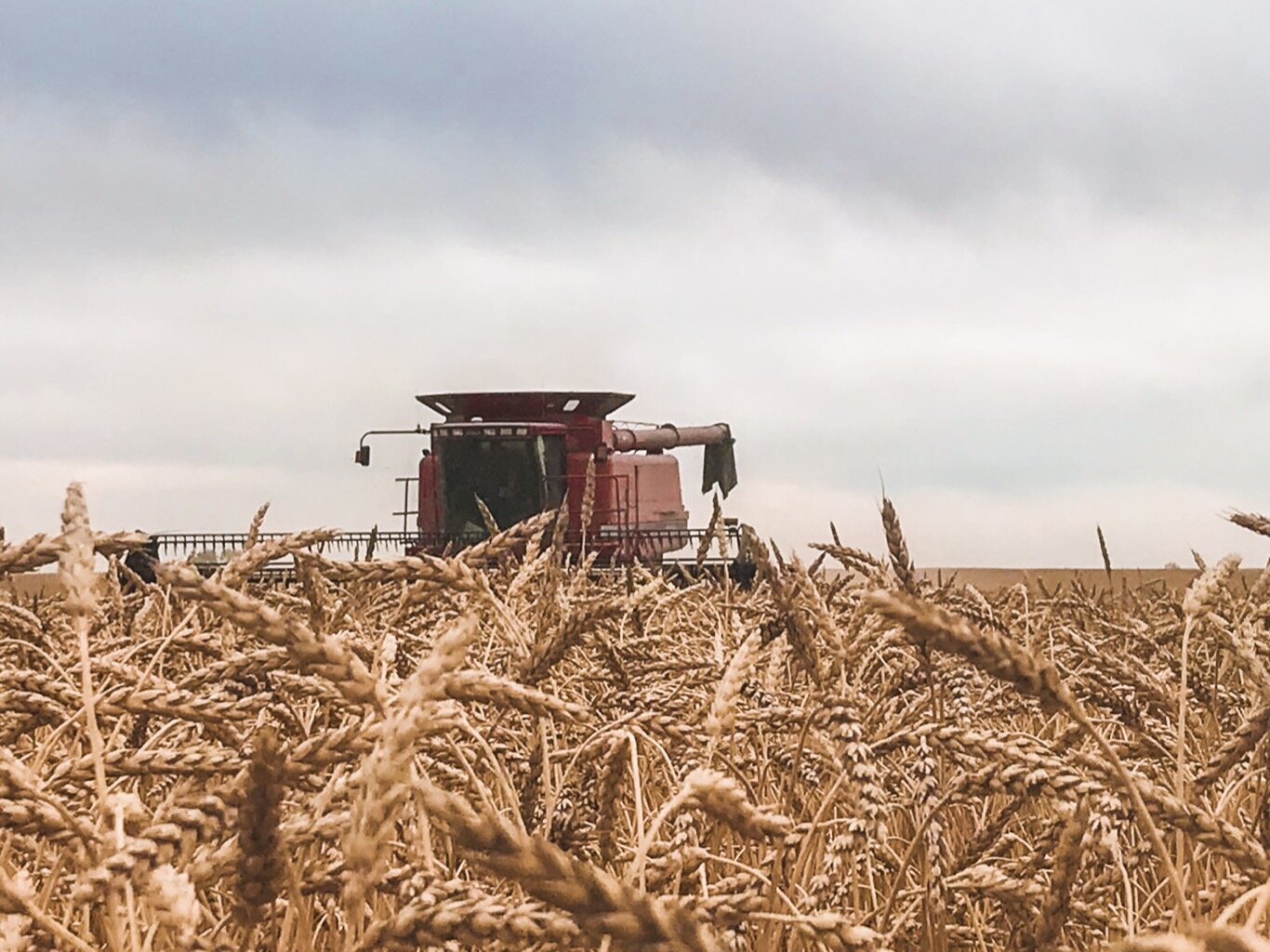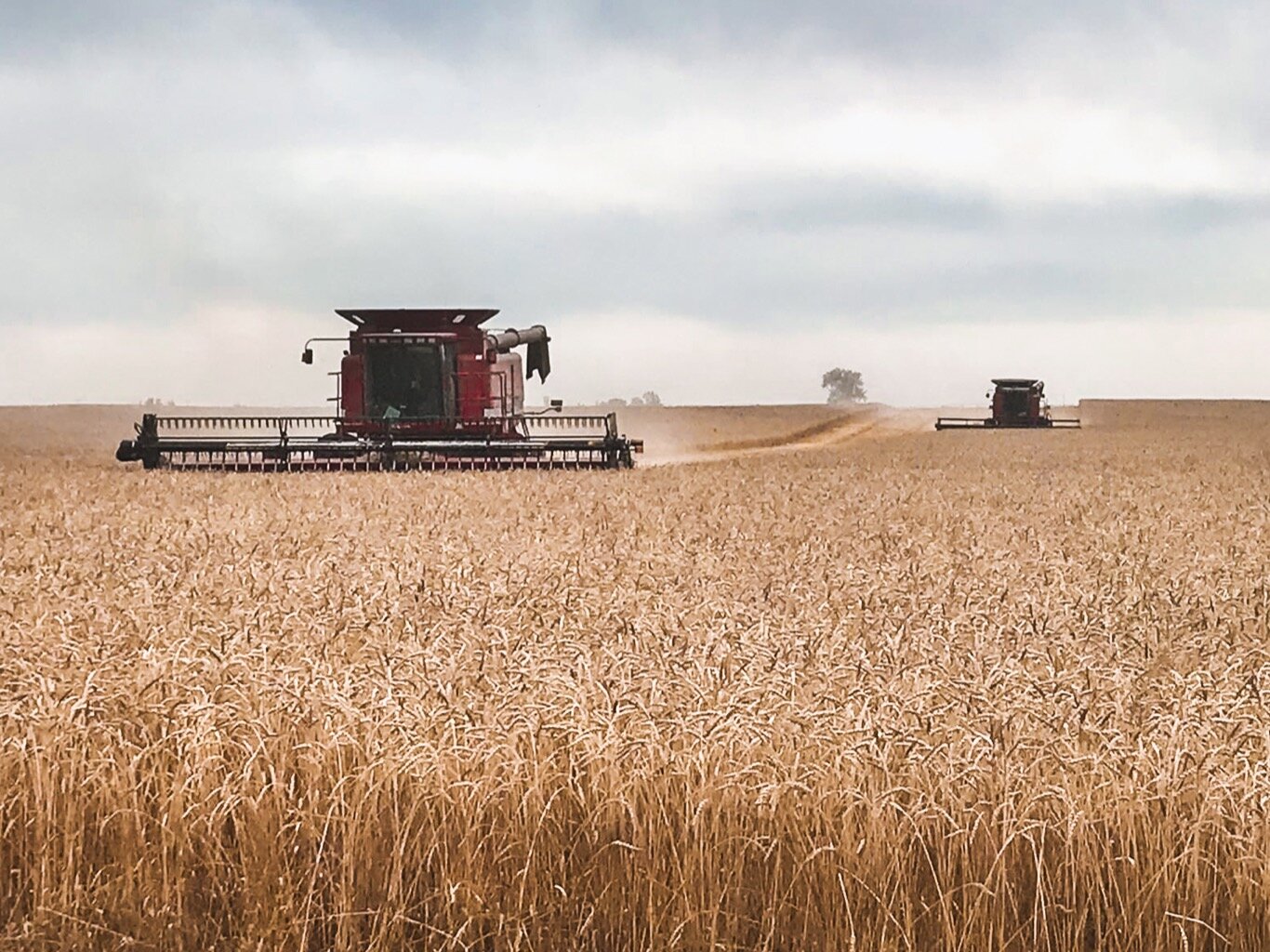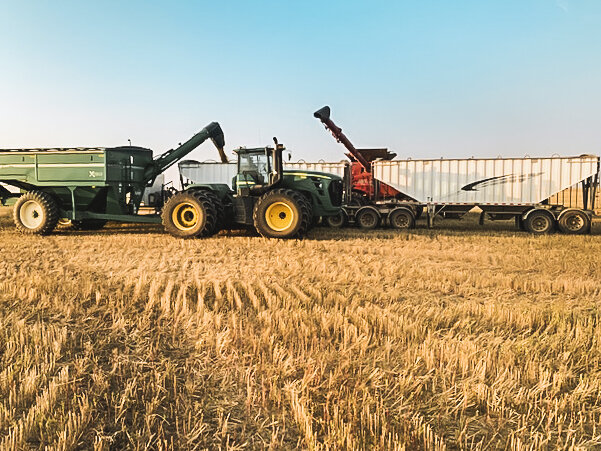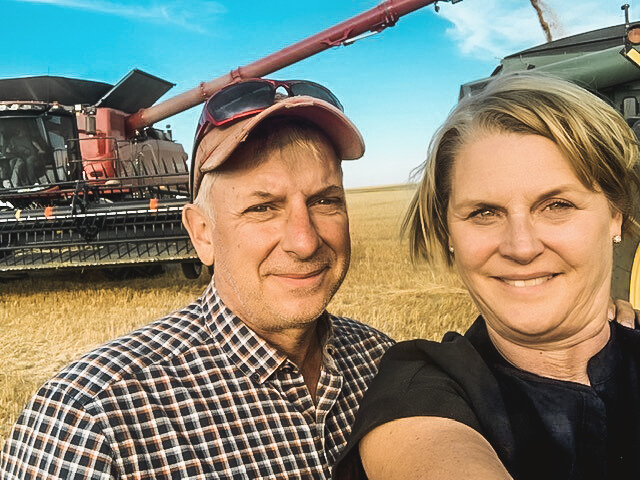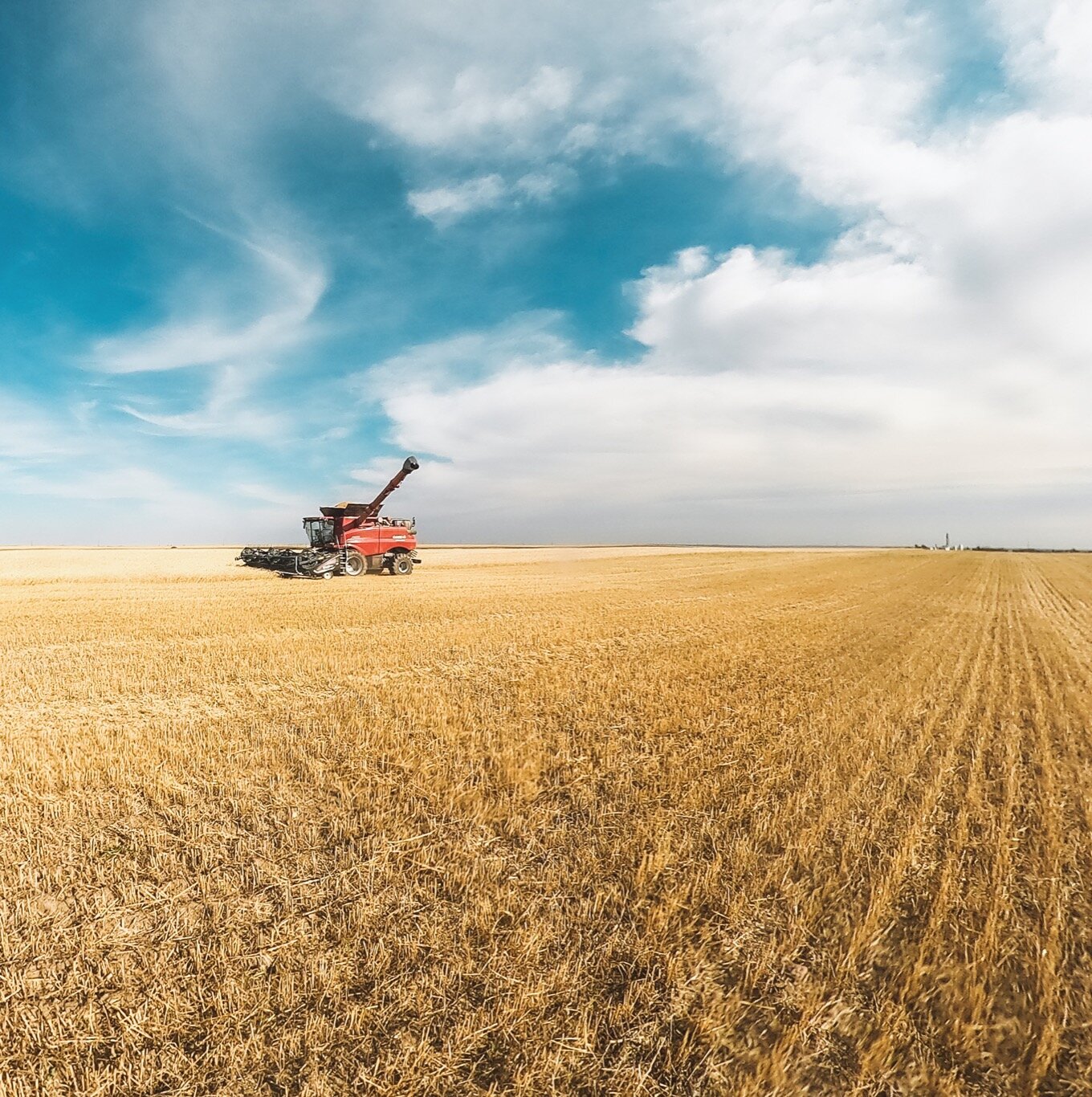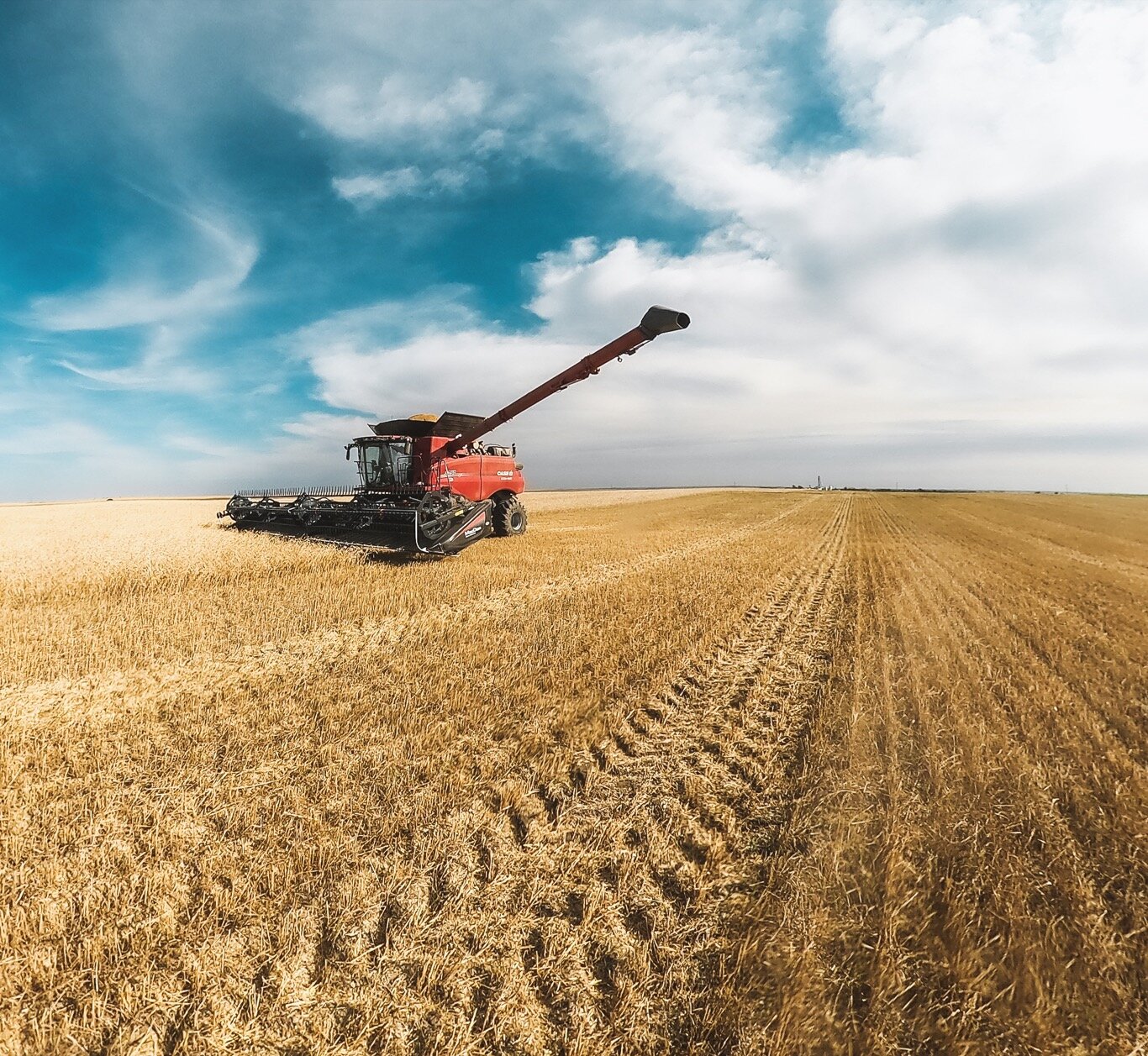IN THE MIDST OF BUSY DAYS IN THEIR FIELDS, BRAD AND PIERRE TWO OF OUR FARMERS, TOOK A MOMENT TO SHARE THEIR THOUGHTS ON ORGANIC FARMING AND THE CHALLENGES THAT COME WITH IT.
Brad Boot
Where is your farm located?
Outlook, Saskatchewan which is about 95km south of Saskatoon.
How long have you been a farmer? And what are some of the reasons you chose to be an organic farmer?
Well, I grew up on a dairy farm which my dad still has. About nine years ago started my own farm growing mostly wheat, but of course with crop rotation what I grow varies. There are a lot of reasons my father and I now farm organically, which all started with his dairy farm. As a kid, my dad did things organically without trying, but as the farm increased, we started using more chemicals mainly for reasons of efficiency. We started to notice that the crops we used to feed our cows were affecting their health poorly. Their immune systems were weaker, they were more susceptible to disease, and just not producing a lot of milk. Our crops just didn’t have the energy or nutrients that the cows required. We didn’t know what we were needing to change, but we knew we needed to do things differently.
Through this we learned about BRIX which is essentially a measurement of sugar levels in a plant. This started opening up ways we could utilize microbiology as our BRIX measurements showed us that the minerals in our soil were out of balance. In the conventional world of farming there is a lot of emphasis on phosphorus and potassium in soil, but when we switched to organic farming, we started to learn about the importance of calcium for soil health. Another major learning in this whole process was that our use of the chemical Round-Up was ruining all the good minerals in our soil. So instead, we started using more biologically friendly fertilizers like fish fertilizers that benefit the microbiology of our soil. It took about three years or organic farming and understanding the power of adding microbiology to our soil for us to really start noticing the cow’s health and milk production improving. Now I am primarily running my wheat farm while my dad continues to farm his dairy cows, but we both have learned that when you work with nature it really does reward you in the end.
when you work with nature it really does reward you in the end.
What are some of the challenges that come with running an organic farm?
Managing moisture and managing weeds! I read a book called Weeds and why the grow by Jay McCaman and learned that weeds grow in soil to correct mineral imbalances. On my farm, I found that using high available calcium and phosphorus creates a less likely environment for weeks to grow because doing so balances out the minerals. An interesting thing to note though is that weeds can benefit the plants if the minerals in the soil are balanced correctly. Understanding how to manage weeds in a natural way can create a more nutrient dense crop. Basically, the more of that you have, the more vitamins and minerals you get out of less. Since with organic farming you don’t have those chemicals in there you have more vitamins and minerals that the crop gets. So, when it comes to weeds, I have learned how to better control them, but I am not concerned about eliminating them all. Rather than killing everything other than my crops, with organic farming I’ve learned how to work with biology.
Rather than killing everything other than my crops, with organic farming I’ve learned how to work with biology.
Can you please explain to us how difficult it is to grow grains without the use of chemicals? Are you bothered by pests? If so, how do you handle Pests without compromising the quality of the grain?
Certainly, there are still below ground insects like cutworms that are not good for the crop. In the conventional world of farming, I would have used a poison to kill these, but learning more about the biology of these insects I have learned that they don’t have a pancreas. This means they can’t process anything with a high sugar content and therefore they are attracted to plants that aren’t healthy. So, using this knowledge as an organic farmer I can treat the seed I plant with cane sugar, minerals, and nutrients, so when it germinates the crop is strong and has a high sugar content which cutworms and other insects can’t handle and avoid.
Another challenge with organically growing grains without the use of chemicals but rather organic preventative products is figuring out how to do it all economically, so it is profitable at the end of the day.
What is your favourite grain or crop to grow, and why? Is there one that you think is underrated that everyone should give a try?
I have two!
Einkorn is my number one because I think it’s fascinating how unique it is to grow nature’s first wheat that isn’t hybridized by humans in any way.
Modern day wheats because they’re easy to grow and they yield really well.
Do you bake or cook? If so, what is your favourite thing to make?
I don’t but my wife does. Her favourite thing to make is Einkorn bread. I’m sure she’d love to share her recipe!
Einkorn Bread
This Einkorn bread is a go-to recipe for Brad Boot and his family at Prairie Genesis farm where our Einkorn grain is farmed. The Boot’s say this hearty loaf is best enjoyed in good company at a neighbourhood BBQ!
Do you have any resources about organic farming/lifestyle that you could recommend?
I learned a LOT from the book,Weeds and Why they Grow by Jay McCaman
Soil Works LLC. This is a YouTube channel that my mentor, Glen Rabenberg started. He is an internationally known speaker, soil expert, organic farmer and CEO who’s also learned a lot from Dr. Carey Reams. Glen also has several other amazing resources including his podcast Soil Works: Correct the Cause Featuring Glen Rabenberg. Any resource that he or Dr. Carey has offered is worth looking into if you’re interested in learning more about the important of soil health and organic farming.
Final question! If you could have a dinner party without covid restrictions or any limitations, where is the party, who are you inviting, and what are you eating and drinking?
Well, I am not much of a partier, but I think I’d like to have a backyard BBQ. Invite my neighbours, friends, and customers and just eat from good bread, good steaks and kombucha.
Pierre Auclair
Where is your farm located?
Radville, Saskatchewan about 130km South of Regina.
(Right hand photo: Alex and Janet Galarneau, of Prairie Heritage Seeds )
How long have you been a farmer? And what are some of the reasons you chose to be an organic farmer?
We are now into the third generation of farmers established in southern Saskatchewan. And counting since our son has also started to farm! We chose to farm organic back in the early 1980s, and at that time it was called “chemical free.” We chose to farm organically in order to grow better crops and be more sustainable.
We chose to farm organic back in the early 1980s, and at that time it was called “chemical free.” We chose to farm organically in order to grow better crops and be more sustainable.
What are some of the challenges that come with running an organic farm?
Crop rotation, and weeds are the biggest challenges we are constantly working through.
What is your favourite grain or crop to grow, and why? Is there one that you think is underrated that everyone should give a try?
Well, KAMUT of course! But we might be a tad biased since that’s what we mainly grow, and love!
Do you bake or cook? If so, what is your favourite thing to make?
Pancakes for the kids on Sunday mornings and we usually have some sort of fresh sourdough bread.
Ancient Grain Pancakes
These ancient grain pancakes made with Kamut and Spelt are a nutritious and simple way to start any day!
Do you have any resources about organic farming/lifestyle that you could recommend?
We listen to podcasts like Wise Traditions, favourite is #210, Wheat You Can Eat:
Final question! If you could have a dinner party without covid restrictions or any limitations, where is the party, who are you inviting, and what are you eating?
All of our KAMUT farmers will be invited to a giant barbecue on a beautiful prairie day.


